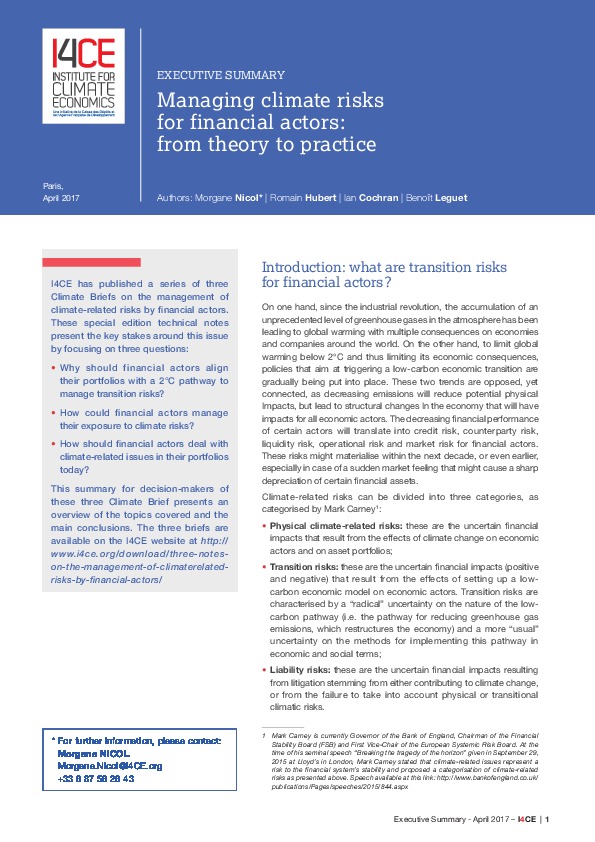Three notes on the management of climate-related risks by financial actors
I4CE has published a series of three Climate Briefs on the management of climate-related risks by financial actors. These special edition technical notes present the key stakes around this issue by focusing on three questions:
- Executive Summary – Managing climate risks for financial actors: from theory to practice
- Why should financial actors align their portfolios with a 2°C pathway to manage transition risks?
- How could financial actors manage their exposure to climate risks?
- How should financial actors deal with climate-related issues in their portfolios today?
Introduction: what are transition risks for financial actors?
On one hand, since the industrial revolution, the accumulation of an unprecedented level of greenhouse gases in the atmosphere has been leading to global warming with multiple consequences on economies and companies around the world. On the other hand, to limit global warming below 2°C and thus limiting its economic consequences, policies that aim at triggering a low-carbon economic transition are gradually being put into place. These two trends are opposed, yet connected, as decreasing emissions will reduce potential physical Impacts, but lead to structural changes In the economy that will have impacts for all economic actors. The decreasing financial performance of certain actors will translate into credit risk, counterparty risk, liquidity risk, operational risk and market risk for financial actors. These risks might materialise within the next decade, or even earlier, especially in case of a sudden market feeling that might cause a sharp depreciation of certain financial assets.
Climate-related risks can be divided into three categories, as categorised by Mark Carney:
- Physical climate-related risks: these are the uncertain financial impacts that result from the effects of climate change on economic actors and on asset portfolios;
- Transition risks: these are the uncertain financial impacts (positive and negative) that result from the effects of setting up a low-carbon economic model on economic actors. Transition risks are characterised by a “radical” uncertainty on the nature of the low-carbon pathway (i.e. the pathway for reducing greenhouse gas emissions, which restructures the economy) and a more “usual” uncertainty on the methods for implementing this pathway in economic and social terms;
- Liability risks: these are the uncertain financial impacts resulting from litigation stemming from either contributing to climate change, or from the failure to take into account physical or transitional climatic risks.
The analysis presented in these three Climate Briefs focuses on transition risks. The management of physical climate-related risks by financial actors is equally important, but requires another strategy to be followed and a different analysis to be carried out. The management of physical climate risks by financial actors will be addressed in a separate project by I4CE.
Mark Carney is currently Governor of the Bank of England, Chairman of the Financial Stability Board (FSB) and First Vice-Chair of the European Systemic Risk Board. At the time of his seminal speech “Breaking the tragedy of the horizon” given in September 29, 2015 at Lloyd’s in London, Mark Carney stated that climate-related issues represent a risk to the financial system’s stability and proposed a categorisation of climate-related risks as presented above. Speech available at this link: http://www.bankofengland.co.uk/publications/Pages/speeches/2015/844.aspx

